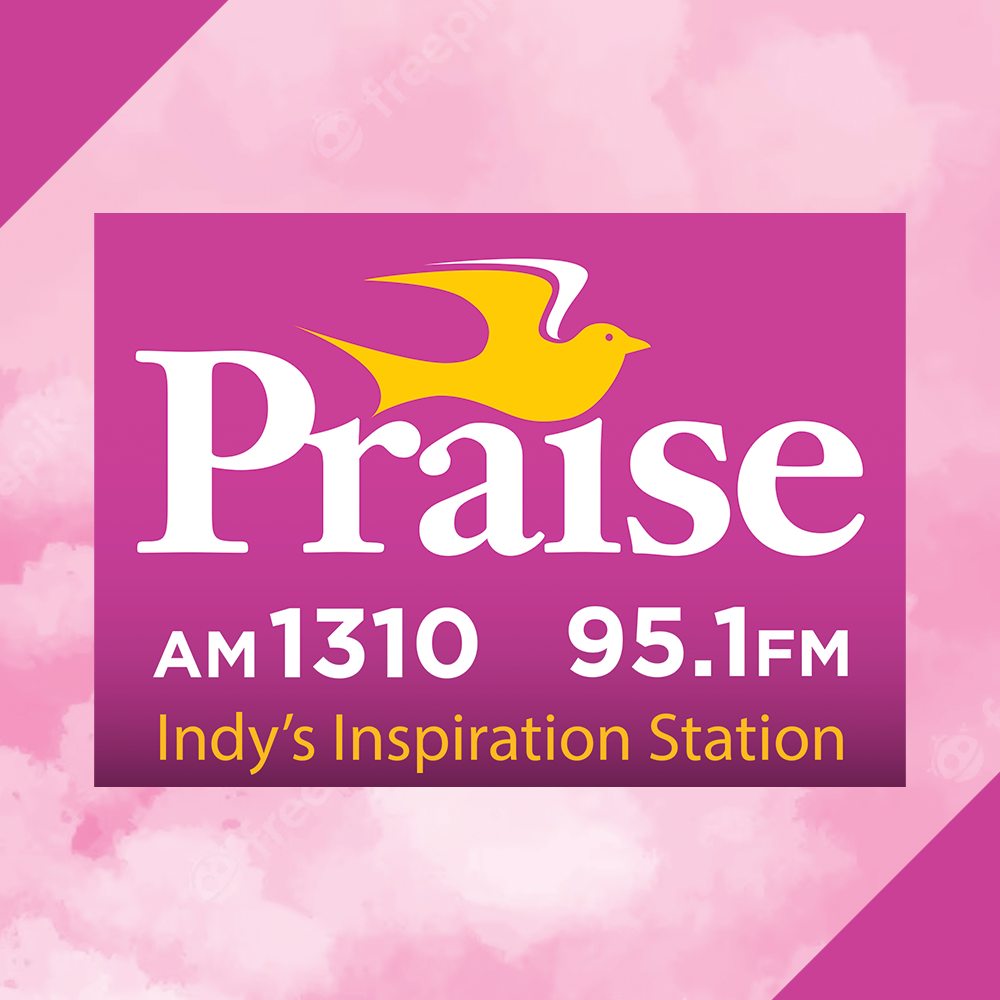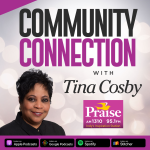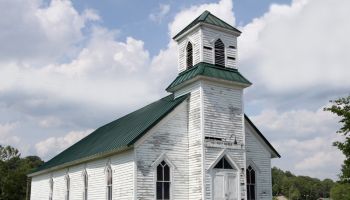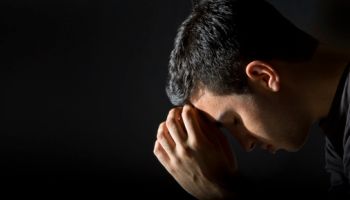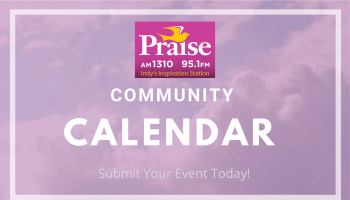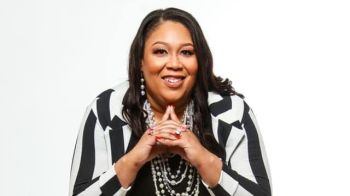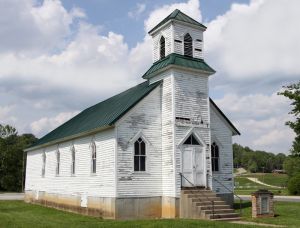
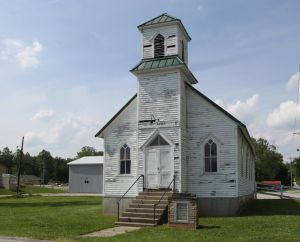 In the late 19th Century and for much of the 20th Century, the southern Indiana towns of West Baden Springs and French Lick were known for their healing mineral waters and two world class hotels, each named after the respective towns. These two hotels and resorts were renowned throughout America and the world. Staffing those hotels as cooks, butlers and maids, were African-American men and women. They and their families settled in the towns of French Lick and West Baden, two adjoining towns some 107 miles southwest of Indianapolis in Orange County, Indiana. For the growing Black community at the time spiritual life was important to those who lived and worked in the two towns. So, West Baden Springs Hotel owner Lee Sinclair donated the land for the First Baptist Church, more often called the West Baden Springs Colored Baptist Church or the Negro Baptist Church. It was a more practical than philanthropic move that recognized the beneficial role such an institution would play in the lives of his workforce — the African American waiters, bell-boys and porters recruited to work at the grand hotels. The congregation built a white frame Gothic Revival church in 1920 at 8034 West Sinclair Street. During that segregated era, it became the thriving center of African American social and religious culture in French Lick and West Baden.
In the late 19th Century and for much of the 20th Century, the southern Indiana towns of West Baden Springs and French Lick were known for their healing mineral waters and two world class hotels, each named after the respective towns. These two hotels and resorts were renowned throughout America and the world. Staffing those hotels as cooks, butlers and maids, were African-American men and women. They and their families settled in the towns of French Lick and West Baden, two adjoining towns some 107 miles southwest of Indianapolis in Orange County, Indiana. For the growing Black community at the time spiritual life was important to those who lived and worked in the two towns. So, West Baden Springs Hotel owner Lee Sinclair donated the land for the First Baptist Church, more often called the West Baden Springs Colored Baptist Church or the Negro Baptist Church. It was a more practical than philanthropic move that recognized the beneficial role such an institution would play in the lives of his workforce — the African American waiters, bell-boys and porters recruited to work at the grand hotels. The congregation built a white frame Gothic Revival church in 1920 at 8034 West Sinclair Street. During that segregated era, it became the thriving center of African American social and religious culture in French Lick and West Baden. 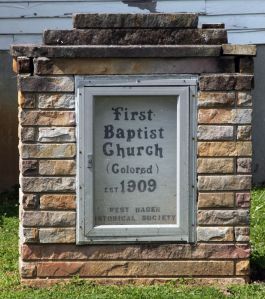
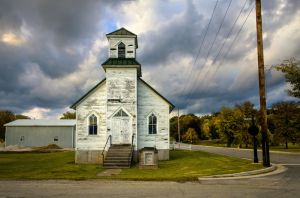 Today that church has become one of Indiana’s ten most endangered landmarks and has been placed on the annual list of endangered structures by Indiana Landmarks. Founded in 1960, Indiana Landmarks is a non profit organization with a mission to revitalizes communities, reconnects us to Indiana’s heritage, and to save meaningful places in the state. Indiana Landmarks now ranks as the largest private statewide preservation group in the United States, with headquarters in Indianapolis and eight regional offices around the state staffed by professionals who help Hoosiers save and restore old buildings. Appearing on Afternoons with Amos Indiana Landmarks President Marsh Davis and Southern Regional Director Greg Sakula talked about the history and significance of the West Baden Springs Colored Church and why the structure needs to be saved. Sakula talked about the role the church played in the life of the African-Americans who lived and worked in the twin towns. Both Davis and Sakula spoke of the importance of preserving this aspect of Indiana History and African-American community. The Town of West Baden Springs and its residents have also played a key role in helping to preserve the church. When in 1991 the church’s congregation had dwindled to a single member, that individual, acting as the church, donated the building to the West Baden Historical Society. But in 2011, the Society disbanded. But they donated the church to the town of West Baden Springs itself. Despite tight finances of Indiana’s cities and towns, West Baden has done what they can to preserve and protect the church. The town has tried to sell it, without success. The West Baden Springs Colored Church is a listed landmark on The National Register. The town of West Baden Springs and Indiana Landmarks are looking for a preservation-minded buyer who’ll give it a sustaining new purpose — a home, a business, a restaurant, a retail shop. There are ways our community can help. You can make a donation to Indiana Landmarks, specifically to their African-American Heritage Grants Fund. This fund, operated through Indiana Landmark’s African-American Landmarks This committee assists local communities in preserving African-American landmarks. Check out the views of this historic structure. (Photos Courtesy Indiana Landmarks). Click the Link to Find Out More Details on Indiana Landmarks African-American Landmarks Committee. Click To Learn About Indiana Landmarks African American Heritage Fund Click the Media Player to Hear the Story of West Baden Springs Colored Church and How YOU Can Save a Bit of Indiana’s African-American History. Runs 16 Minutes ©2014 WTLC/Radio One.
Today that church has become one of Indiana’s ten most endangered landmarks and has been placed on the annual list of endangered structures by Indiana Landmarks. Founded in 1960, Indiana Landmarks is a non profit organization with a mission to revitalizes communities, reconnects us to Indiana’s heritage, and to save meaningful places in the state. Indiana Landmarks now ranks as the largest private statewide preservation group in the United States, with headquarters in Indianapolis and eight regional offices around the state staffed by professionals who help Hoosiers save and restore old buildings. Appearing on Afternoons with Amos Indiana Landmarks President Marsh Davis and Southern Regional Director Greg Sakula talked about the history and significance of the West Baden Springs Colored Church and why the structure needs to be saved. Sakula talked about the role the church played in the life of the African-Americans who lived and worked in the twin towns. Both Davis and Sakula spoke of the importance of preserving this aspect of Indiana History and African-American community. The Town of West Baden Springs and its residents have also played a key role in helping to preserve the church. When in 1991 the church’s congregation had dwindled to a single member, that individual, acting as the church, donated the building to the West Baden Historical Society. But in 2011, the Society disbanded. But they donated the church to the town of West Baden Springs itself. Despite tight finances of Indiana’s cities and towns, West Baden has done what they can to preserve and protect the church. The town has tried to sell it, without success. The West Baden Springs Colored Church is a listed landmark on The National Register. The town of West Baden Springs and Indiana Landmarks are looking for a preservation-minded buyer who’ll give it a sustaining new purpose — a home, a business, a restaurant, a retail shop. There are ways our community can help. You can make a donation to Indiana Landmarks, specifically to their African-American Heritage Grants Fund. This fund, operated through Indiana Landmark’s African-American Landmarks This committee assists local communities in preserving African-American landmarks. Check out the views of this historic structure. (Photos Courtesy Indiana Landmarks). Click the Link to Find Out More Details on Indiana Landmarks African-American Landmarks Committee. Click To Learn About Indiana Landmarks African American Heritage Fund Click the Media Player to Hear the Story of West Baden Springs Colored Church and How YOU Can Save a Bit of Indiana’s African-American History. Runs 16 Minutes ©2014 WTLC/Radio One.
